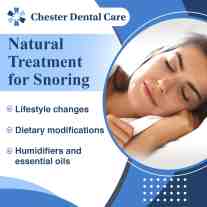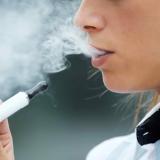We often think of snoring as an annoying habit, but it can also signal deeper health concerns. Many people don't realize the strong link between snoring and oral health. At Chester Dental Care, your trusted family dental clinic in Chester, VA, we help identify and address snoring-related issues to improve overall well-being.
Snoring happens when airflow is blocked during sleep. This blockage occurs when tissues in the throat relax too much, causing vibrations as air passes through. While occasional snoring is normal, persistent snoring can indicate underlying health issues that need attention. Identifying the cause is the first step in finding effective treatments for snoring.
Key Takeaways
-
Snoring can indicate serious health issues - It may be linked to sleep apnea, airway obstruction, and oral health problems.
-
Oral health and snoring are connected - Dry mouth, cavities, gum disease, and teeth grinding often occur with snoring.
-
Jaw position affects snoring - Misalignment can restrict airflow, and dental treatments may help improve breathing.
-
Natural treatments can reduce snoring - Snoring treatment exercises, side sleeping, nasal rinses, and weight management can help.
-
Oral appliances offer an effective solution - Custom devices reposition the jaw to keep airways open and reduce snoring.
What Causes Snoring?
Snoring happens when airflow is blocked during sleep. This blockage occurs when tissues in the throat relax too much, causing vibrations as air passes through. Several factors contribute to this issue, including nasal congestion, obesity, alcohol consumption, and sleep position. Oral structures also play a role. A narrow dental arch, tongue position, and jaw alignment can reduce airway space, increasing the likelihood of snoring.
A common cause of snoring is nasal obstruction. Allergies, colds, or sinus infections can block nasal passages, forcing mouth breathing and increasing snoring. Structural issues, such as a deviated septum or enlarged tonsils, can also contribute. People who are overweight may have excess tissue around the throat that further narrows the airway. Lifestyle choices like alcohol and sedative use relax throat muscles, making airway blockage more likely. Addressing these factors can lead to effective snore treatments.
The National Sleep Foundation reports that 32% of U.S. adults snore at least a few nights per week, while about 24% say they snore nearly every night. (fmcsa.dot.gov)

How Snoring Affects Oral Health
Snoring leads to dry mouth, bad breath, and an increased risk of cavities. When someone snores, they often breathe through their mouth, reducing saliva flow. Saliva protects against bacteria, so a dry mouth makes teeth more vulnerable to decay. Gum disease and inflammation are also more common in those who snore. Over time, these issues can lead to more severe dental problems, including tooth loss.
Snoring can also contribute to temporomandibular joint (TMJ) disorders. When the airway is restricted, the body may compensate by clenching the jaw or shifting the tongue to open the airway. This can lead to jaw pain, headaches, and uneven tooth wear. Addressing snoring early on can help prevent these complications and maintain oral health.
Snoring and Sleep Apnea: A Serious Connection
Snoring can be a warning sign of obstructive sleep apnea (OSA). OSA is a condition where breathing repeatedly stops and starts during sleep due to airway obstruction. People with OSA often experience fatigue, headaches, high blood pressure, and an increased risk of heart disease. At Chester Dental Care, we provide the best snore treatments. We assess airway health to determine if snoring is linked to a larger issue like sleep apnea.
Unlike mild snoring, sleep apnea is a serious condition that requires medical attention. Patients with OSA may wake up multiple times during the night gasping for air. This disrupts deep sleep, leading to daytime drowsiness and reduced concentration. If left untreated, OSA increases the risk of stroke, heart attack, and diabetes. Identifying and treating sleep apnea early can improve quality of life and reduce long-term health risks.
The Federal Motor Carrier Safety Administration (FMCSA) reports that as many as 18 million Americans experience symptoms of sleep apnea, often without realizing they have this serious, potentially life-threatening disorder (fmcsa.dot.gov).
Jaw Position and Bite Alignment's Role in Snoring
A misaligned jaw or improper bite can restrict airflow. If the lower jaw sits too far back, it pushes the tongue into the airway, leading to snoring. A high palate or crowded teeth can also reduce airway space. Orthodontic treatments, such as expanders or clear aligners, can improve airflow by correcting alignment issues.
The jaw position plays a vital role in maintaining an open airway. When the jaw is not positioned correctly, it can collapse the airway during sleep, increasing snoring severity. In some cases, dental treatments like oral appliances or bite adjustments can reposition the jaw, allowing for better airflow and reducing snoring. Addressing alignment issues can be an effective natural treatment for snoring.
It is interesting to note that men tend to snore louder than women, consistent across all sleep stages, body positions, and weight categories (pmc.ncbi.nlm.nih.gov).
Teeth Grinding and Snoring: A Common Connection
Bruxism (teeth grinding) often occurs alongside snoring. When the airway is partially blocked, the body reacts by clenching the jaw to open the airway. This can lead to worn enamel, jaw pain, and TMJ disorders. Many patients who snore also experience morning headaches and facial discomfort. Identifying and treating airway issues can help reduce grinding and protect teeth.
Chronic teeth grinding can cause long-term damage, including cracked teeth, gum recession, and increased tooth sensitivity. Nightguards can help protect teeth, but addressing the root cause-airway obstruction-is key. If grinding is linked to snoring, treating the airway issue may reduce both problems.

How We Help Reduce Snoring
At Chester Dental Care, we offer custom oral appliances designed to gently reposition the lower jaw, improving airflow and preventing airway collapse. These comfortable, non-invasive devices provide an effective alternative to CPAP therapy for mild to moderate sleep apnea.
As a Vivos Integrated Clinic, we specialize in Vivos® System treatments to address airway and sleep-related disorders, including obstructive sleep apnea (OSA). Our approach focuses on non-surgical, non-invasive solutions like oral appliance therapy and craniofacial development treatments to enhance long-term airway function.
For patients who struggle with CPAP machines, oral appliances offer a customized, comfortable option that maintains natural jaw movement while keeping the airway open. When combined with myofunctional therapy, which strengthens airway muscles and promotes better breathing habits, these treatments provide a lasting solution for snoring and sleep apnea relief.
Snoring Treatment at Home: Natural Remedies and Lifestyle Changes
Certain habits and home treatments can reduce snoring. Sleeping on your side, maintaining a healthy weight, and avoiding alcohol before bed can make a difference. Nasal strips and saline rinses help open nasal passages. Exercises for the mouth and throat, such as repeatedly saying certain vowel sounds or practicing tongue slides, can strengthen the muscles of the airway over time.
Developing healthy sleep habits is one of the most effective ways to manage snoring at home. Elevating the head during sleep can help keep airways open. Avoiding heavy meals before bedtime reduces the chance of acid reflux, which can worsen snoring. Humidifiers can also keep the air moist, reducing throat irritation and airway constriction.
Long-Term Solutions for Snoring
Dental and lifestyle changes can help manage snoring permanently. Expanding the palate with orthodontic treatments creates more airway space. If allergies contribute to congestion, treating inflammation can improve breathing. A combination of professional snore treatments and at-home strategies can offer lasting relief.
For those seeking a natural treatment for snoring, dietary changes may help. Reducing dairy intake can minimize mucus buildup while staying hydrated and prevent throat tissues from becoming too dry. Practicing consistent sleep routines and stress management techniques, such as meditation or deep breathing exercises, can further improve sleep quality.
FAQs About Snoring and Oral Health
Can dental issues contribute to snoring?
Yes, a misaligned jaw, narrow airway, and improper tongue posture can restrict airflow, leading to snoring. At Chester Dental Care, we offer treatments for snoring, including oral appliances that improve airflow.
What are some natural treatments for snoring?
Snoring treatment exercises, side sleeping, nasal rinses, and maintaining a healthy weight can be helpful treatments for snoring. Chester Dental Care also provides non-invasive solutions to strengthen airway muscles.
How does snoring affect oral health?
Snoring can lead to dry mouth, which increases the risk of cavities, gum disease, and bad breath. Chester Dental Care offers treatments for snoring that help reduce mouth breathing and improve oral health.
Can a dentist help with snoring?
Yes, at Chester Dental Care, we offer treatments for snoring, such as custom oral appliances that reposition the jaw, allowing for better airflow and reduced snoring.
Is snoring always a sign of sleep apnea?
Not always, but persistent snoring can be a warning sign. Chester Dental Care provides evaluations and treatments for snoring to determine if further testing or treatment is needed.
Conclusion
Snoring isn't just a nighttime disturbance-it can signal underlying dental and airway concerns that impact overall health. By addressing the problem early and with proper treatment for snoring, you can improve sleep quality, protect oral health, and reduce the risk of serious conditions like sleep apnea. At Chester Dental Care, we offer personalized solutions to help you or a loved one breathe easier and sleep better. Contact us today by phone at (804) 748-2555 or via email at frontdesk@chesterdentalcareva.com to take the first step toward a healthier and more restful night's sleep.



